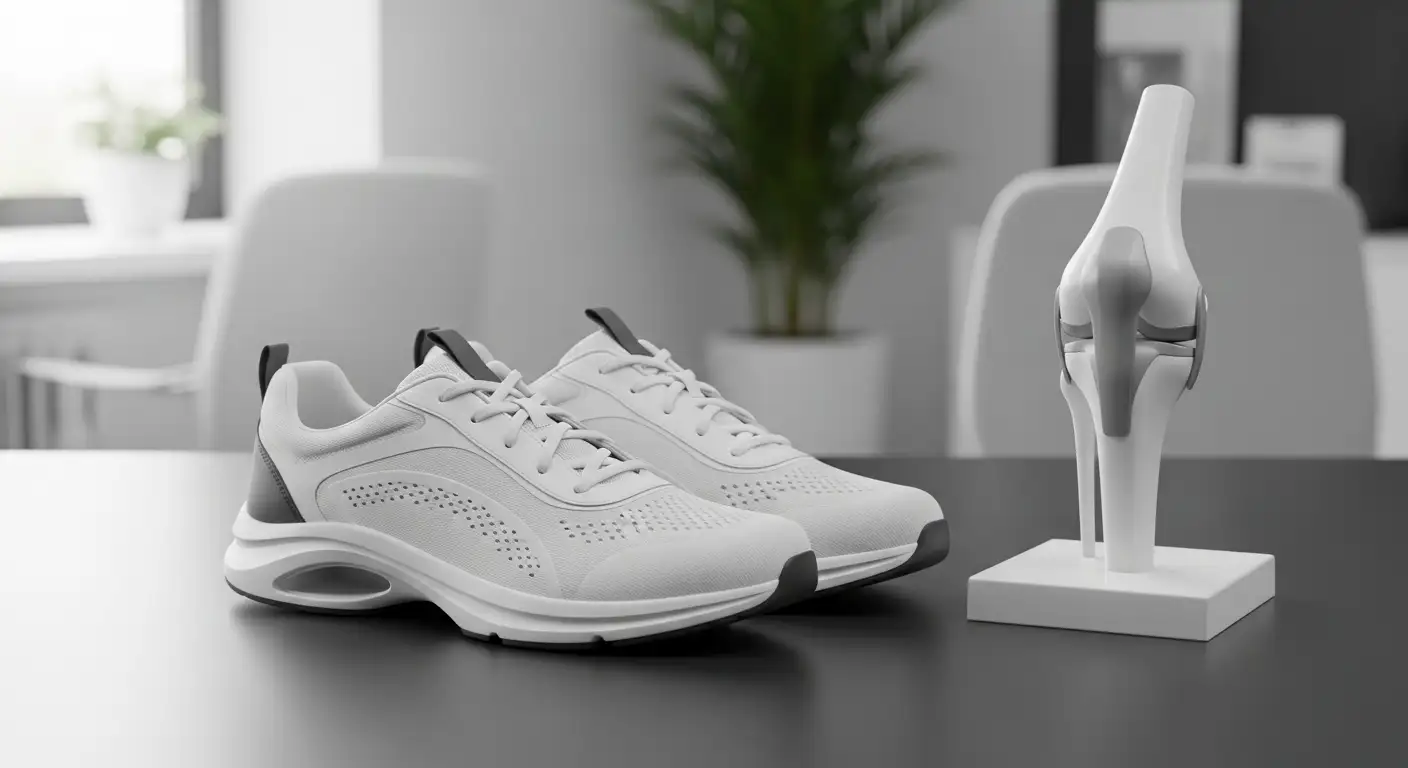Understanding the Role of Injectable Treatments in Knee Osteoarthritis
Knee osteoarthritis (OA) is a common degenerative joint condition that affects millions worldwide, often leading to significant pain and disability. While knee replacement surgery remains a definitive solution for advanced OA, many patients seek conservative interventions to manage symptoms and delay surgery. Viscosupplementation, involving hyaluronic acid injections, has emerged as a promising option. This article explores how viscosupplementation can serve as an effective strategy to extend the lifespan of natural joints, improve quality of life, and potentially postpone or prevent invasive surgical procedures.
What is Viscosupplementation and How Does It Work?
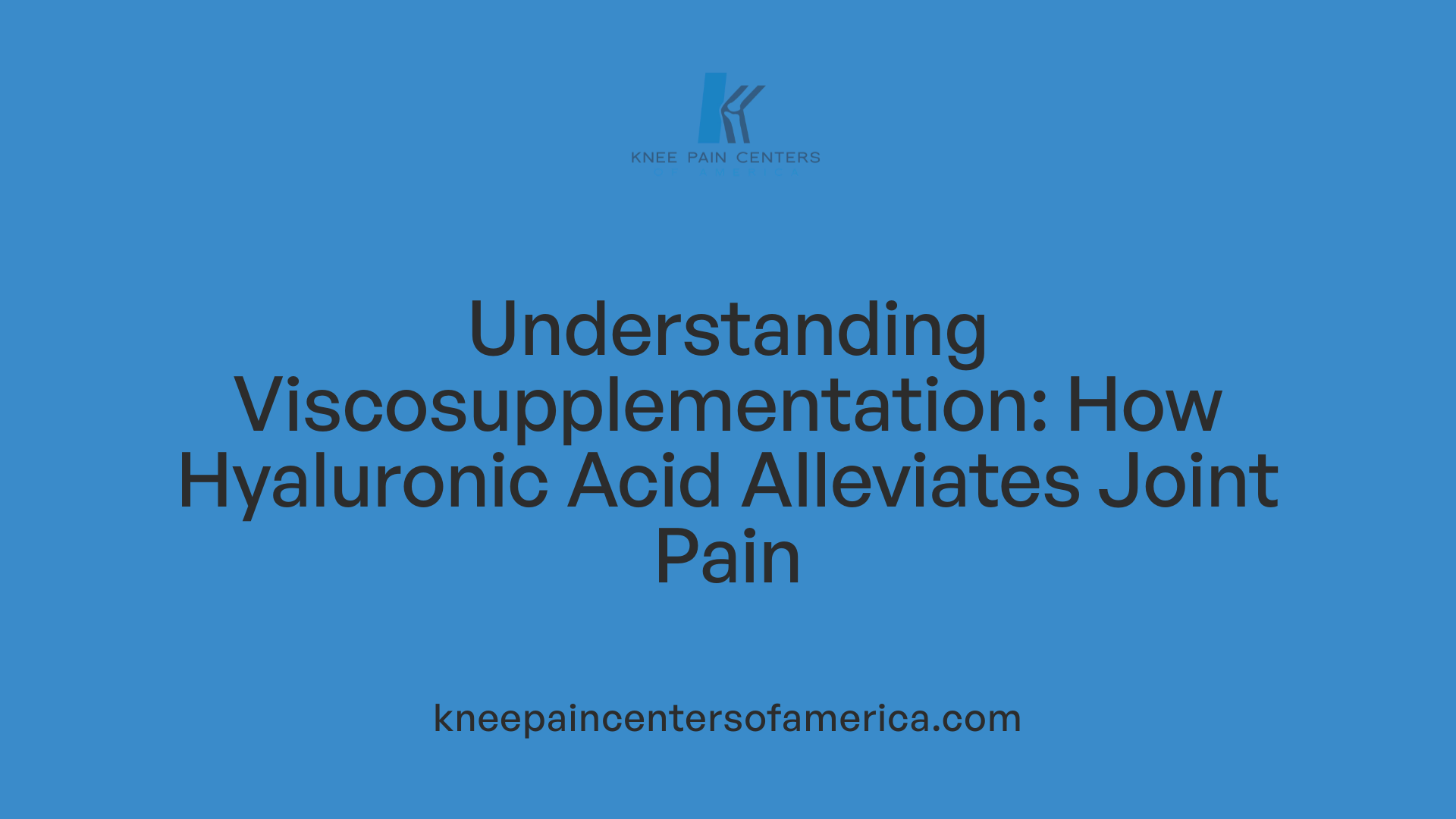
What is Viscosupplementation?
Viscosupplementation is a medical treatment involving the injection of hyaluronic acid directly into the joint, especially the knee, to help alleviate symptoms of osteoarthritis. This minimally invasive procedure aims to restore the natural lubricating properties of synovial fluid, which becomes less effective as arthritis progresses.
Role of Hyaluronic Acid in Joints
Hyaluronic acid (HA) is a naturally occurring substance in the body, primarily found in connective tissues and synovial fluid. In healthy joints, HA acts as a cushion and lubricant, providing elasticity and shock absorption. It helps maintain hydration and reduces friction between joint surfaces. In osteoarthritis, the concentration and quality of HA in the joint decrease, leading to increased pain, stiffness, and joint damage.
How Does Viscosupplementation Work in Osteoarthritis?
The main goal of viscosupplementation is to supplement the diminishing hyaluronic acid in osteoarthritic joints. Injected HA restores the viscoelasticity—combining viscosity and elasticity—of synovial fluid, improving lubrication and cushioning. This reduces the mechanical stress on joint tissues, which can decrease pain and inflammation.
Research shows that HA injections also modulate inflammatory processes by downregulating pro-inflammatory factors like PGE2 and NFkB. Additionally, they reduce the production of enzymes called matrix metalloproteinases that degrade joint cartilage, potentially slowing disease progression.
What Is Involved in the Procedure of Knee Gel Injections, and How Suitable Is It for Different Patients? Knee gel injections, or viscosupplementation, typically involve a healthcare provider injecting hyaluronic acid into the knee joint to improve lubrication, reduce pain, and modulate disease progression. The procedure is performed in a clinic setting, often guided by ultrasound or X-ray imaging to ensure accurate placement.
The process includes sterilizing the area, administering a local anesthetic to minimize discomfort, and then injecting the HA through a fine needle. Patients usually undergo a series of injections over three to five weeks, depending on the product used.
Most individuals with mild to moderate osteoarthritis benefit from this treatment. It is particularly suitable for those seeking to delay surgery or avoid more invasive procedures. While the process is generally safe, mild side effects such as soreness, swelling, or temporary stiffness at the injection site are common.
Repeated injections are considered safe and can be performed as needed. However, while effective for many patients, those with advanced osteoarthritis or certain joint deformities might find limited relief. Overall, viscosupplementation provides an effective option for managing symptoms and potentially extending joint function over time.
The Biological and Mechanical Benefits of Hyaluronic Acid in the Joint
Viscosupplementation, a common treatment for osteoarthritis, involves injecting hyaluronic acid (HA) into affected joints. This treatment aims to restore the natural viscosity of synovial fluid, which becomes thinner and less effective due to cartilage wear and tear.
Hyaluronic acid plays a vital role in lubricating and cushioning the joint, reducing friction during movement. Its viscoelastic properties provide shock absorption, helping preserve joint structures and improve mobility.
On a biochemical level, HA influences inflammation and tissue degeneration. It downregulates pro-inflammatory factors such as prostaglandin E2 (PGE2) and nuclear factor kappa B (NFkB), which are involved in joint inflammation. Moreover, HA reduces the production of matrix metalloproteinases, enzymes that break down cartilage, potentially slowing disease progression.
Research indicates that injecting hyaluronic acid can delay osteoarthritis progression by improving joint biomechanics and reducing inflammation. Large studies have shown that multiple courses of HA injections can significantly postpone the need for knee replacement surgery—sometimes by over three years.
In summary, hyaluronic acid provides both mechanical benefits of lubrication and cushioning, as well as biochemical effects that may slow joint degeneration. While some evidence suggests modest pain relief and improved function, it is important to note that benefits vary among individuals, and recent reviews have called for further research to confirm long-term efficacy.
Clinical Evidence Supporting Viscosupplementation’s Role in Delaying Surgery
Large-scale studies have provided strong support for the role of hyaluronic acid injections in delaying knee replacement surgery. One notable analysis involved over 182,000 patients with knee osteoarthritis, revealing that those receiving multiple courses of hyaluronic acid injections experienced a significant extension in the time before they needed total knee replacement (TKR). Specifically, patients with no injections had a median time-to-TKR of about 114 days, whereas those receiving injections saw this delay extend to roughly 484 days.
Research also shows a dose-dependent relationship: patients receiving five or more courses of injections could delay surgery by approximately 3.6 years. These results are supported by hazard ratios in studies, indicating that each additional course of treatment reduces the risk of progressing to surgery.
Comparing single versus repeated injections, evidence suggests that repeated HA treatments are more effective in postponing knee replacement. Patients who undergo multiple injections benefit from longer periods of symptom relief and slower disease progression, highlighting the importance of treatment frequency.
Overall, comprehensive clinical data, including large health database analyses, affirms that viscosupplementation with hyaluronic acid can serve as a valuable strategy to control symptoms and extend the duration before surgical options become necessary.
Mechanisms by Which Viscosupplementation May Influence Disease Progression
How does viscosupplementation influence the progression of osteoarthritis?
Viscosupplementation involves injecting hyaluronic acid (HA) into the osteoarthritic joint to restore the natural viscosity of synovial fluid. This process helps improve lubrication, reduce friction, and cushion joint surfaces, potentially slowing cartilage wear.
Beyond mechanical effects, HA has biochemical actions that may influence disease progression. It downregulates pro-inflammatory factors like PGE2 and NFkB, which are involved in joint inflammation. Additionally, HA reduces the production of matrix metalloproteinases—enzymes that break down joint tissues—thereby attempting to protect cartilage and other joint structures.
Clinically, viscosupplementation offers pain relief and improves joint function, especially in early to moderate osteoarthritis. Some large-scale research suggests it can delay the need for joint replacement surgery by slowing the degeneration process. However, findings are mixed; systematic reviews point out that the benefits are small and statistically comparable to placebo or other treatments in some cases.
While it may be a helpful component of managing osteoarthritis, the influence of viscosupplementation on disease progression is still under study. Its ability to modify the underlying pathology of osteoarthritis remains uncertain, with evidence indicating modest benefits and some concerns about effectiveness and safety in certain populations.
The Influence of Repeated Hyaluronic Acid Injections on Surgery Delay
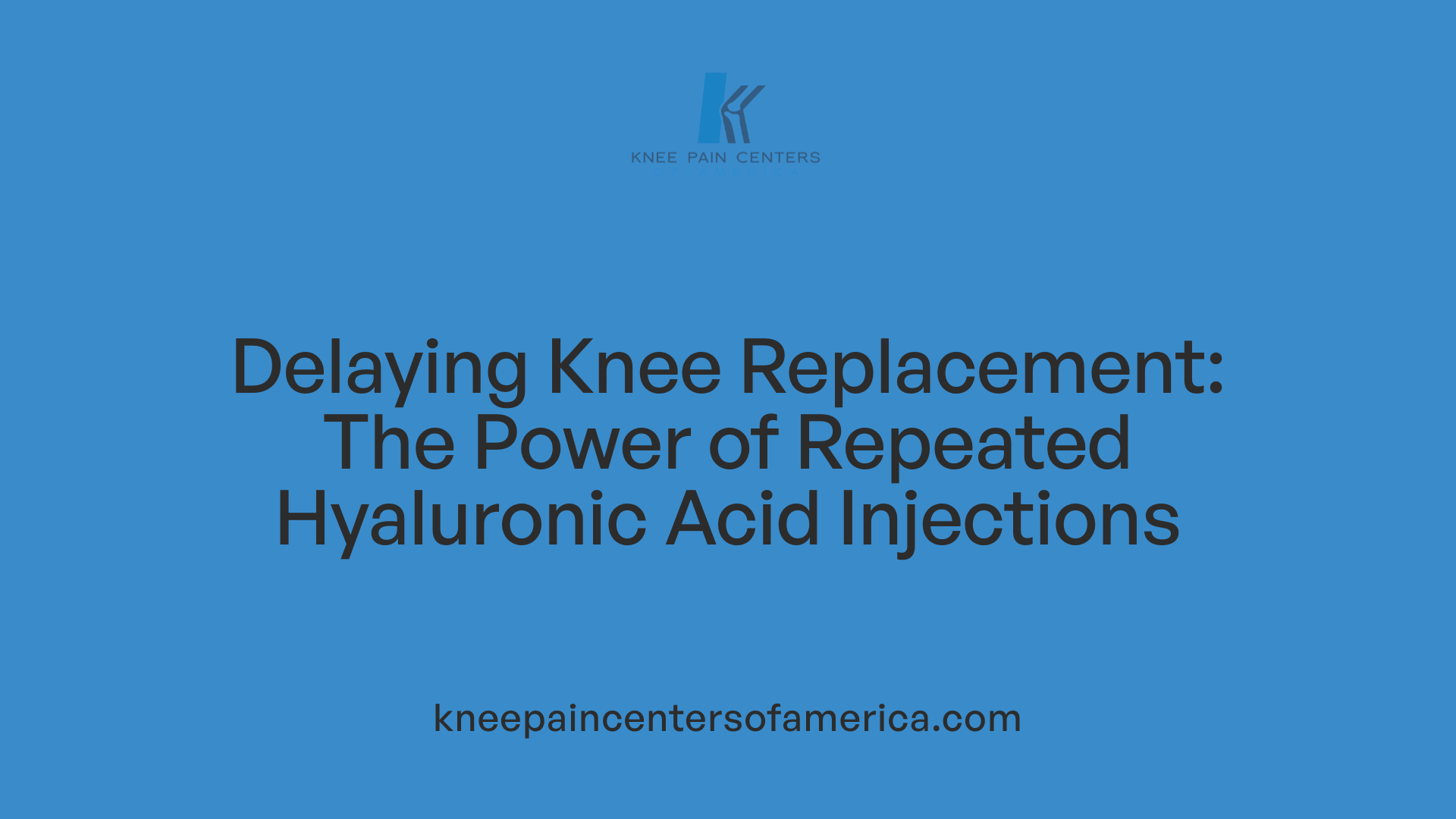
How can viscosupplementation delay or prevent knee surgery, such as knee replacement?
Viscosupplementation with hyaluronic acid (HA) injections offers a proven way to extend the period before patients with osteoarthritis need to undergo knee replacement surgery. These injections work by easing pain, enhancing joint mobility, and reducing inflammation.
The treatment restores the natural viscoelastic properties of synovial fluid, which deteriorate with osteoarthritis. This slowdown in joint degeneration can significantly delay disease progression.
Research involving large patient samples indicates that repeated courses of HA injections are particularly effective. Data shows that patients who received multiple treatments—especially five or more courses—delayed knee replacement surgery by up to 3.6 years on average. One study analyzed 182,022 patients and found that those receiving HA injections had a median time-to-Knee Replacement (TKR) of approximately 484 days, compared to just 114 days for patients who did not receive injections.
Patients with mild to moderate osteoarthritis benefit the most from this approach, as their joint condition is more amenable to slowing. The evidence suggests that each additional course of HA correlates with a reduced risk of progressing to surgery.
Number of injections and duration of delay
The total number of HA injections directly influences the delay in surgical need. A single injection might offer relief for a few months, but repeated injections—particularly five or more—have been associated with a delay of over 3 years. This dosing strategy extends the window during which patients can maintain their joint function and quality of life without invasive procedures.
Dose-dependent effects
Research supports a dose-dependent effect, meaning that more courses of HA injections lead to a longer delay before knee replacement. Longer treatment courses appear to provide a more substantial protective effect, as each additional set of injections reduces the likelihood and urgency of surgery.
Impact on timing of knee replacement surgery
The strategic use of HA injections allows patients to manage symptoms effectively while postponing surgery. Overall, this minimally invasive approach can extend the time before knee replacement by several years, making it a valuable option for those wishing to delay or avoid surgery.
| Number of HA Courses | Median Delay in Surgery | Additional Benefits | Study Reference |
|---|---|---|---|
| 1 course | 1.4 years | Pain relief, improved function | 2015 study (Altman et al.) |
| 5 or more courses | 3.6 years | Longer postponement, symptom management | Large database analysis |
| No injections | 114 days | Faster progression to surgery | Original data set |
In summary, repeated hyaluronic acid injections can significantly delay the progression of osteoarthritis and the need for knee replacement surgery. This approach offers patients a valuable way to improve joint health and enjoy a better quality of life while postponing more invasive treatments.
Safety, Cost, and Patient Suitability for Viscosupplementation
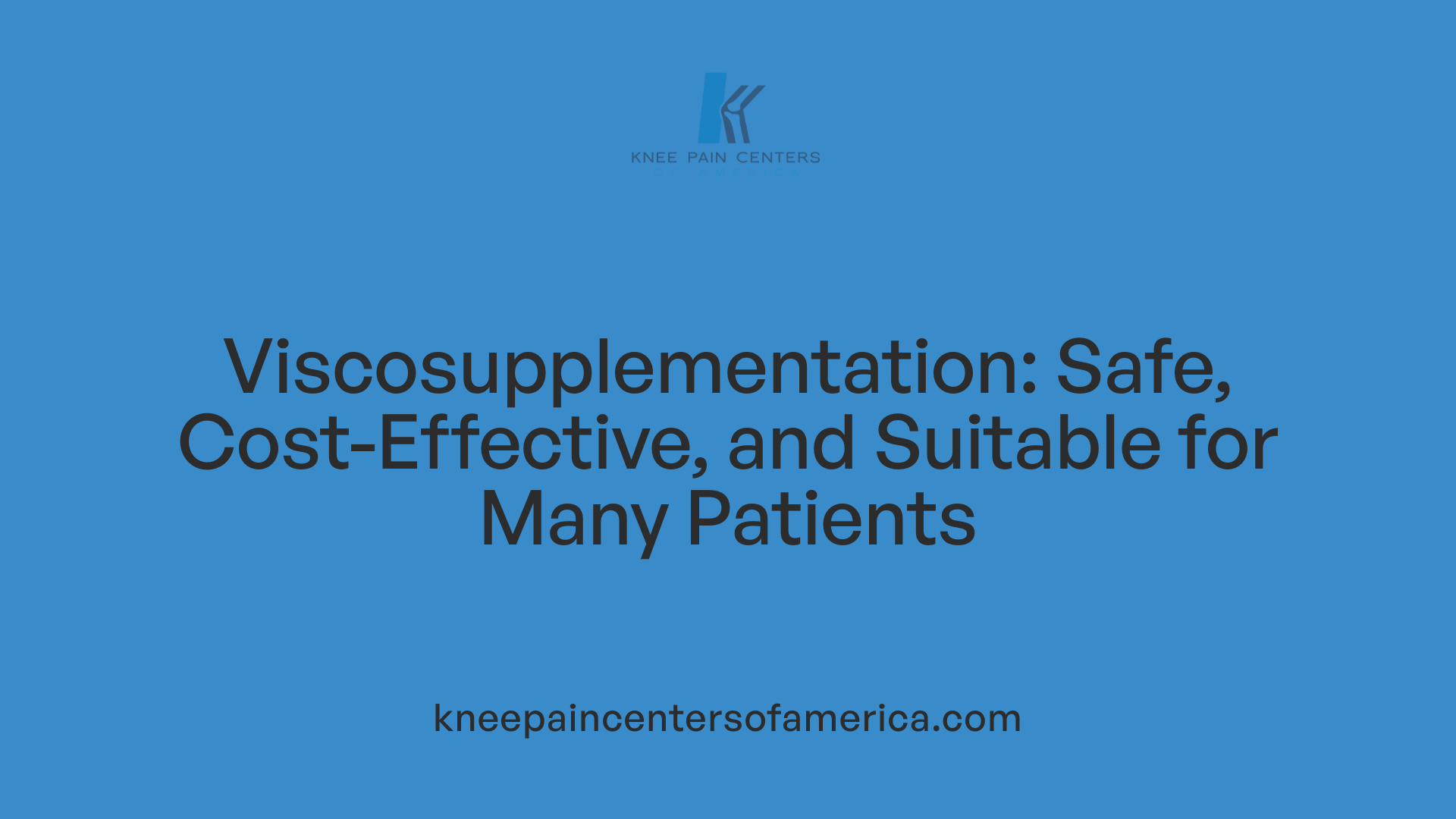
What benefits and potential does viscosupplementation offer as a conservative treatment for knee osteoarthritis?
Viscosupplementation with hyaluronic acid (HA) injections provides several advantages for managing knee osteoarthritis. It helps reduce pain, restore joint mobility, and improve overall joint function by replenishing the viscosity and elasticity of synovial fluid. This makes the joint move more smoothly and cushions it against shocks.
The procedure can delay the need for knee replacement surgery by slowing down joint degeneration. It acts as a lubricant and shock absorber, which can reduce inflammation and protect cartilage. Most patients experience relief lasting around six months, with repeated injections often safe and effective.
Safety is a significant benefit: HA injections are minimally invasive, with mild side effects like soreness or swelling common but temporary. Unlike corticosteroids, which may have more systemic effects, HA has fewer serious adverse reactions, especially for individuals with conditions such as high blood pressure or diabetes.
There is growing evidence supporting viscosupplementation, especially for those with mild to moderate osteoarthritis, offering an alternative when other treatments like medications or physical therapy are insufficient. It is also useful for patients who prefer to delay surgery or are not good candidates for invasive procedures.
In summary, viscosupplementation is a promising option that can diminish pain, enhance joint function, and potentially prolong the period before surgical intervention becomes necessary, all while maintaining a good safety profile.
Summary and Future Directions in Viscosupplementation for Knee OA
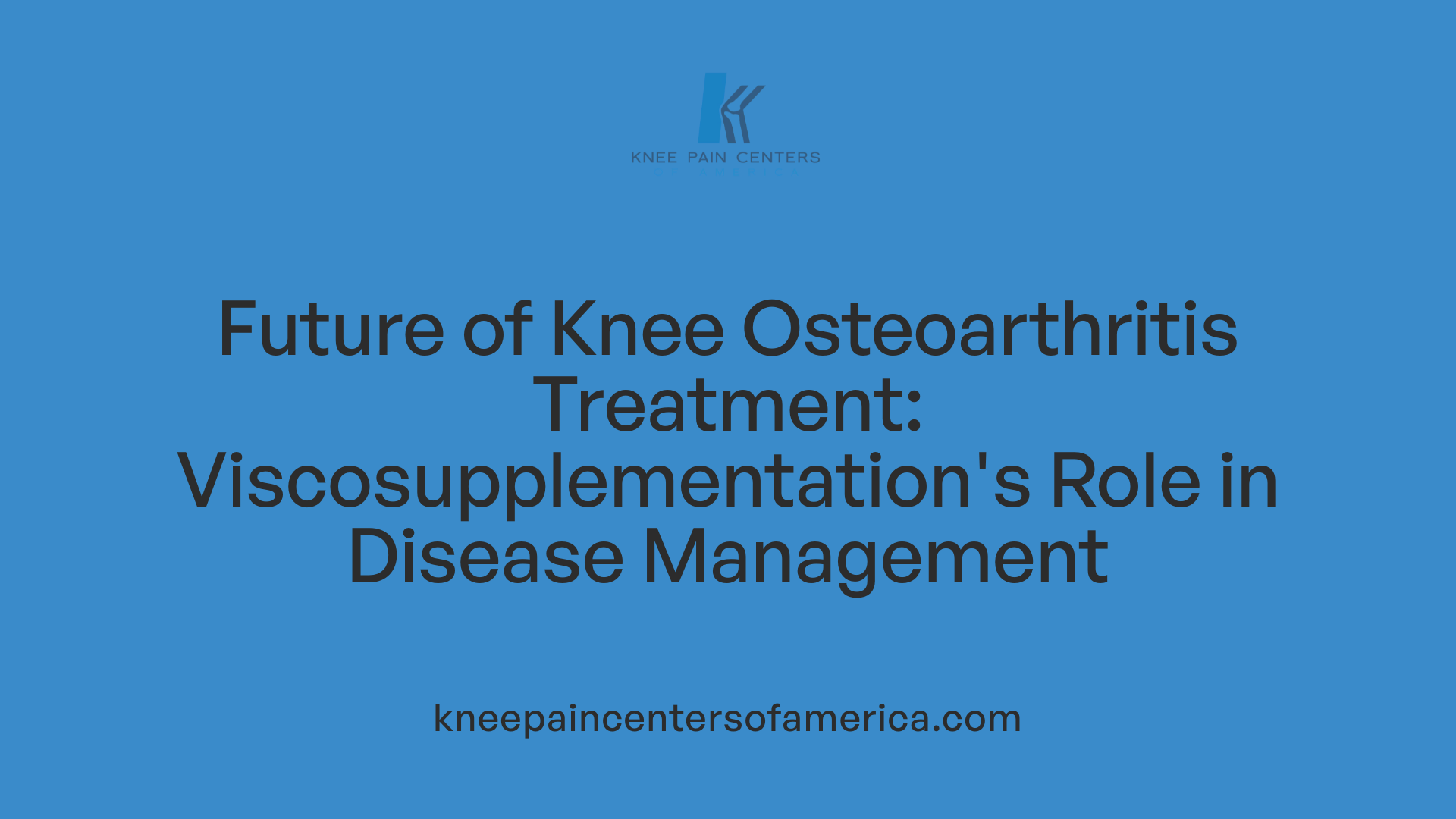
How does viscosupplementation impact the progression of knee osteoarthritis and the potential postponement of surgical intervention?
Viscosupplementation, which involves injecting hyaluronic acid directly into the knee joint, has shown promise in slowing the progression of osteoarthritis. The hyaluronic acid restores the natural viscoelasticity of the synovial fluid, acting as a lubricant and shock absorber. This can help reduce joint inflammation, protect cartilage, and improve overall joint function.
Research involving large patient samples indicates that repeated hyaluronic acid injections may extend the time before a patient requires knee replacement surgery. For example, patients receiving multiple courses of treatment have been found to delay surgical intervention by approximately 3.6 years.
Such delays are significant, especially for those who are not yet ready for surgery or wish to postpone the risks associated with joint replacement. The protective effects of viscosupplementation may preserve joint tissue and slow degeneration, giving patients more quality years before invasive procedures become necessary.
Overall, current evidence supports viscosupplementation as a conservative treatment option capable of managing symptoms and extending joint longevity. While it does not reverse osteoarthritis, it contributes toward delaying advanced surgical interventions, improving patient outcomes and quality of life.
Concluding Remarks: Balancing Benefits and Limitations
While viscosupplementation using hyaluronic acid injections is not a cure for osteoarthritis, it offers an effective means to reduce symptoms and delay the need for knee replacement surgery—especially when performed early and repeated over time. The accumulating scientific evidence, including large-scale population studies, supports its role in extending the joint's functional lifespan. Nonetheless, the variability in individual responses and ongoing debates about its long-term efficacy highlight the importance of individualized treatment planning. As research advances, future developments may further optimize hyaluronic acid formulations, injection protocols, and combined therapies to enhance outcomes. For now, viscosupplementation remains a valuable tool in the armamentarium for conservative management of knee osteoarthritis, offering hope for patients seeking to prolong natural joint function and maintain mobility.
References
- What to Know About Knee Gel Injections ...
- Hyaluronic Acid Injections Are Associated with Delay ...
- Viscosupplementation (Hyaluronic Acid) for Osteoarthritis ...
- Can you avoid knee surgery with viscosupplementation?
- A Comprehensive Review of Viscosupplementation in ...
- Knee Gel Injections (Viscosupplementation)
- Viscosupplementation for Osteoarthritis of the Knee
- When to Consider a Viscosupplementation Injection for ...
- How Viscosupplementation for Knee Osteoarthritis Can ...

